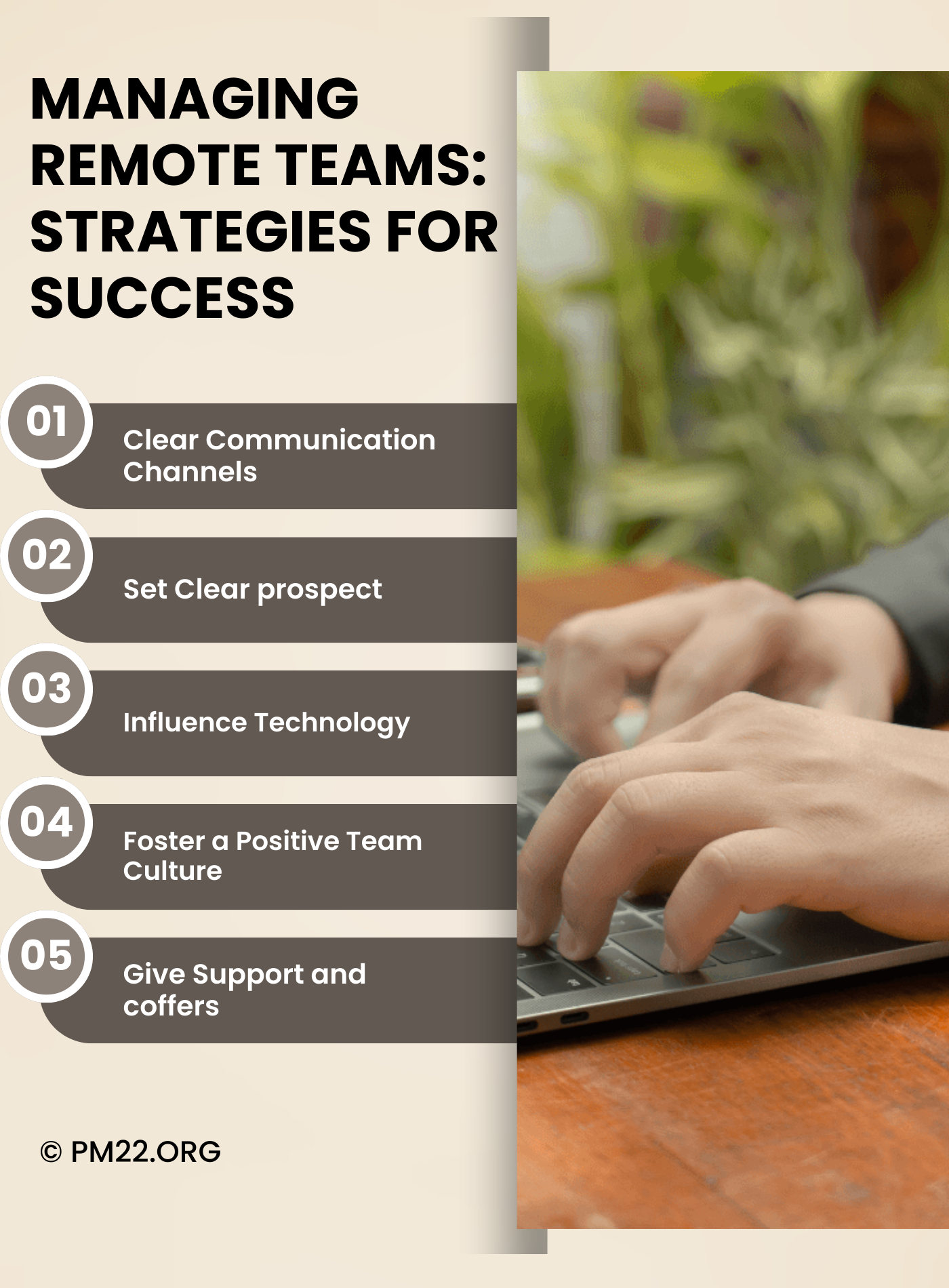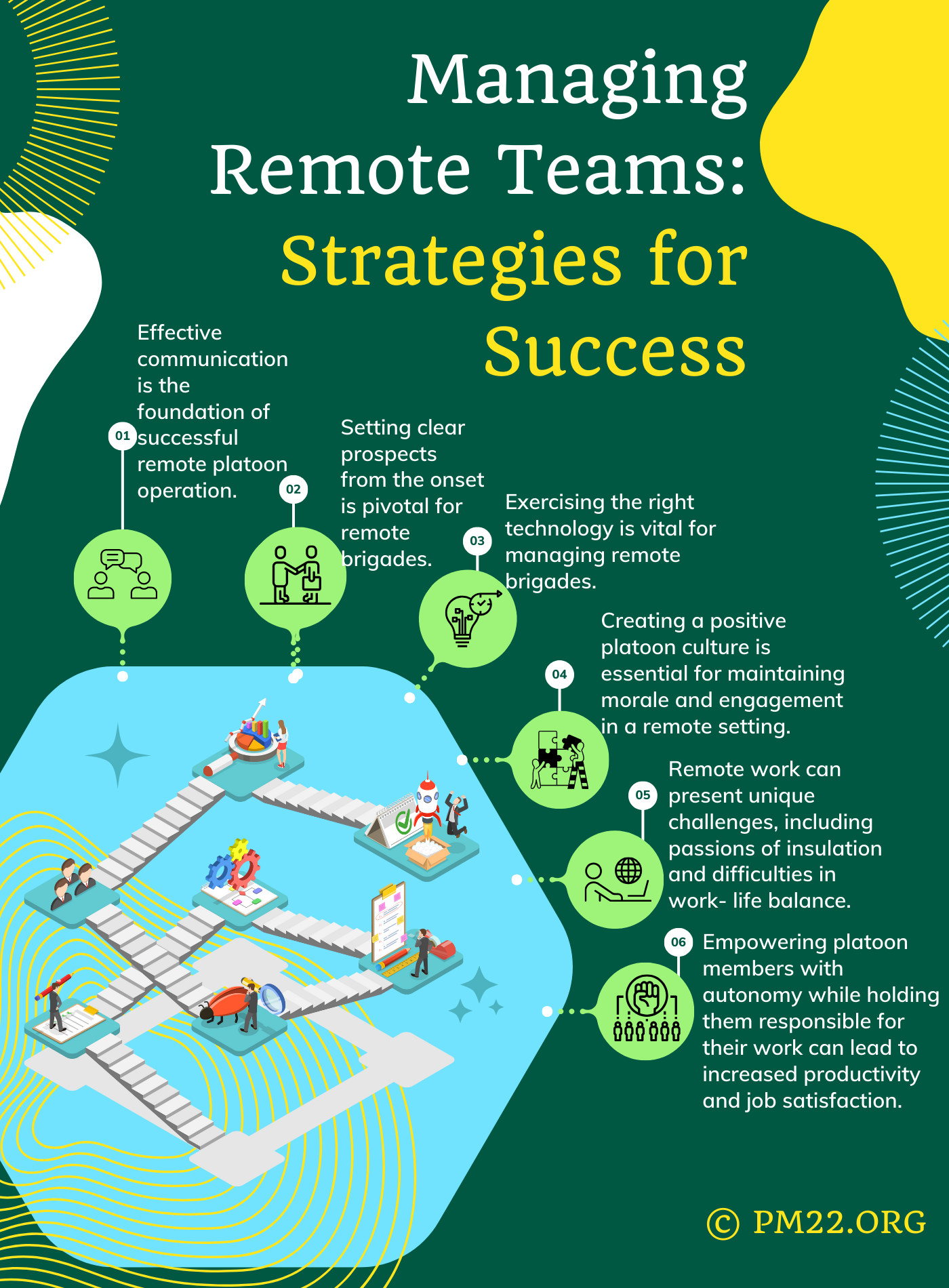 Managing remote Brigades has become an essential skill in the moment’s decreasingly digital and globalized work terrain. The shift to remote work, accelerated by the COVID-19 epidemic, has introduced new dynamics and challenges that bear innovative strategies to ensure productivity, engagement, and collaboration. Then are some effective strategies for managing remote brigades successfully.
Managing remote Brigades has become an essential skill in the moment’s decreasingly digital and globalized work terrain. The shift to remote work, accelerated by the COVID-19 epidemic, has introduced new dynamics and challenges that bear innovative strategies to ensure productivity, engagement, and collaboration. Then are some effective strategies for managing remote brigades successfully.
- Clear Communication Channels
Effective communication is the foundation of successful remote platoon operation. Establish clear and harmonious communication channels to ensure platoon members can fluently partake information and updates. Tools like Slack, Microsoft brigades, and drone grease real- time communication and help maintain a sense of connectivity among platoon members. Regular check- sways, whether through diurnal stage-up meetings or daily videotape calls, can help keep everyone aligned and informed.
CLICK HERE TO DOWNLOAD 300+ PROJECT MANAGEMENT TEMPLATES & DOCUMENTS IN EXCEL
- Set Clear prospect
Setting clear prospects from the onset is pivotal for remote brigades. This includes defining places and liabilities, establishing deadlines, and outlining performance criteria. By furnishing a clear frame, platoon members understand what’s anticipated of them and can manage their time and tasks more effectively. Establishing these prospects in a participated space, like a design operation tool or platoon text, ensures everyone has access to the same information.
- Influence Technology
Exercising the right technology is vital for managing remote brigades. Project operation tools like Asana, Trello, and andMonday.com can help track progress and keep systems on schedule. Collaboration tools similar as Google Workspace and Microsoft 365 enable real- time document sharing and editing, fostering a cooperative work terrain. Also, using time- shadowing tools can help cover productivity and ensure that platoon members are managing their time efficiently.
CLICK HERE TO DOWNLOAD 300+ PROJECT MANAGEMENT TEMPLATES & DOCUMENTS IN EXCEL
- Foster a Positive Team Culture
Creating a positive platoon culture is essential for maintaining morale and engagement in a remote setting. Encourage platoon relating through virtual platoon- structure conditioning, similar as online games, virtual coffee breaks, or themed videotape calls. Feting and celebrating achievements, both big and small, can also boost platoon spirit and provocation. Regularly soliciting feedback from platoon members can help identify areas for enhancement and demonstrate that their opinions are valued.
- Give Support and coffers
Remote work can present unique challenges, including passions of insulation and difficulties in work- life balance. Furnishing the necessary support and coffers can help alleviate these issues. This might include offering flexible working hours, furnishing access to internal health coffers, or offering hires for home office outfit. Icing that platoon members have the tools they need to work effectively, similar as dependable internet access and ergonomic workstations, is also important.
- Encourage Autonomy and Responsibility
Empowering platoon members with autonomy while holding them responsible for their work can lead to increased productivity and job satisfaction. Encourage platoon members to take power of their tasks and systems and trust them to manage their workload. Regular performance reviews and feedback sessions can help keep track of progress and address any issues instantly. By fostering a sense of responsibility, platoon members are more likely to be engaged and motivated.
- Focus on issues, Not Hours
In a remote work terrain, fastening on issues rather than hours worked can lead to better results. Shift the emphasis from tracking hours to assessing the quality and impact of the work produced. This approach allows for lesser inflexibility and can lead to advanced situations of productivity and job satisfaction. It also aligns with the reality that remote work frequently involves varying schedules and work patterns.
Conclusion
Managing remote brigades effectively requires a combination of clear communication, the right technology, and a probative, independent work culture. By setting clear prospects, fostering a positive platoon terrain, and fastening on issues, leaders can navigate the challenges of remote work and drive their brigades to success. As remote work continues to evolve, these strategies will be essential for erecting flexible, productive, and engaged brigades.
